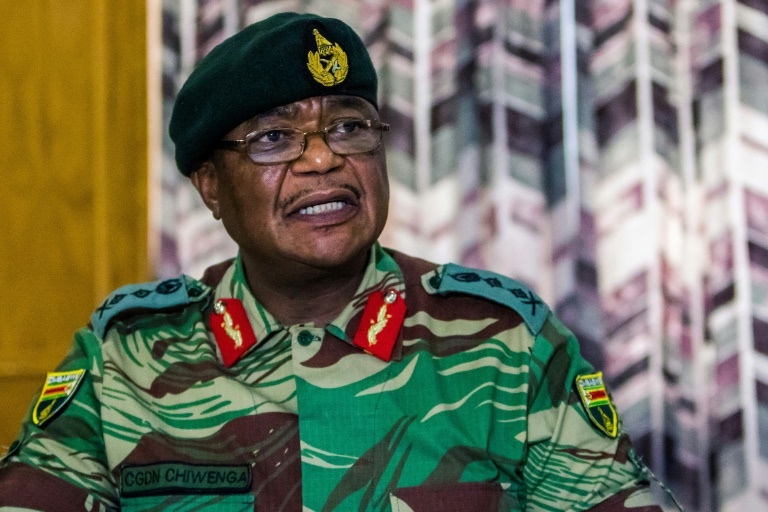The army has had its fingers in every pie for a while now – Zimbabwe's contentious elections and its blood-soaked diamond fields immediately come to mind.

It should come as no surprise that the Zimbabwean army carried out what seems like a coup so swiftly and efficiently.
As the Zimbabwean state has become nearly indistinguishable from the ruling party, Zanu-PF, the military has also been steadily absorbed into many state organs.
The Zimbabwean military has helped retain embattled president Robert Mugabe’s continued rule, and in the process, its leaders have been rewarded with considerable power over state processes and resources.
Examples of the militarisation of governance and the economy include the use of the army’s services in the elections, which Mugabe’s party has repeatedly won and whose legitimacy has been put into question by allegations of rigging, and a sustained monopoly of the country’s diamond fields, to name a few.

This screengrab from Zimbabwe Broadcasting Corporation (ZBC) taken on November 16, 2017, shows Zimbabwe President Robert Mugabe (2R) as he poses alongside Zimbabwe Defence Forces Commander General Constantino Chiwenga (R) and South African envoys at State House in Harare. CREDIT: AFP
There have been allegations of army personnel being spread around the country to drive Zanu-PF’s campaigns and use intimidation in favour of Mugabe’s party during elections. The military’s interference became especially pronounced in the 2008 elections, which MDC-T leader Morgan Tsvangirai lost to Mugabe in a contest that was notable for its violence.
The Marange diamond fields, discovered in 2006, cover about 66 000 hectares, and have reportedly been a cash cow of the Zimbabwean military for some years now. There have been reports of soldiers massacring illegal miners or forcing civilians to mine the precious stones, ensuring that the army and interested parties in government have significant access to the diamond fields and its revenues.
The militarisation of Zimbabwean society has culminated in what has been described by some as the military-industrial complex – the informal entanglements of the army and national security – which props up military power in various forms of government.
The Joint Operations Command (JOC), which oversees Zimbabwean state security, has effectively been turned into a kind of military organ, and has been accused of interfering with electoral process and other state affairs in the past.
The military elites
Some of the military figures who have come to occupy pivotal roles in government and the judiciary include Christopher Mutsvangwa, a war veteran who became a member of Cabinet as the minister of welfare services for war veterans.
Douglas Nyikayaramba was a brigadier in the army before he would become the chief electoral officer in the 2000s. He would later become an army general who publicly insulted Mugabe’s rival, Tsvangirai, in 2011.
Sobusa Gula-Ndebele is a former military intelligence chief who was appointed Zimbabwe’s attorney-general in 2006.
Gula-Ndebele and Mutsvangwa would later turn on Mugabe.
The general and The Crocodile
The Zimbabwean army chief who has led the coup, Constantino Chiwenga, is considered by some to be a political animal, having risen through the ranks of the military since his days in the Zimbabwe African National Liberation Army during the struggle for liberation from white rule.
He was appointed lieutenant-general of Zimbabwe Defence Forces (ZDF) when it was formed in 1994, and became general and commander of the ZDF in 2004.
Chiwenga was involved in and benefited from Zimbabwe’s land-reform programme, and he has been put on the list of European Union sanctions imposed on Zimbabwe in 2002 for human rights abuses at Mugabe’s behest.

Armed forces chief General Constantino Chiwenga set the scene for the military takeover, bluntly warning Mugabe over the sacking of vice president and ally Emmerson Mnangagwa
He is also the chairperson of the JOC, which finds itself at the nexus of the Zimbabwe’s so-called military-industrial complex.
Earlier this year, Grace Mugabe publicly attacked Chiwenga when it became apparent that the army general was aligned with former vice-president Emmerson ‘The Crocodile’ Mnangagwa. But it is clear now she was on to something.
Mnangagwa emerged from political obscurity during the 2008 elections when he came to Mugabe’s rescue and helped him win the second round of elections against MDC-T. He did this with the help of the military, which was then headed by Chiwenga, pointing at a possible alliance between the army general and ‘the Crocodile’ that goes as far back as 2008.
This same alliance with the military, headed by Chiwenga, came into play in the 2013 election that Zanu-PF won.
When Mugabe fired Mnangagwa as his vice-president last week, Chiwenga demanded that the ongoing purge come to an end, and shortly thereafter, the army seized Harare earlier on Wednesday, but the general denied that the takeover was a coup.
Early on Friday, Chiwenga said the military was engaged in discussion with Mugabe on the way forward.
//
For more news your way, follow The Citizen on Facebook and Twitter.






